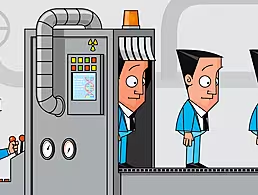When you’re a team leader, handing in your notice can be tricky. Here are some steps to help you get it right.
Quitting your job can be difficult in any circumstances, from thinking about how to approach your boss to having to do it in the new world of remote working.
But things change when you’re a manager or a leader. You have different responsibilities to hand off and telling your colleagues isn’t just a matter of letting people know that you’re off to pastures new, it’s about telling the team that you leave behind what’s going to happen next and alleviating any concerns they may have.
So, if you’re a manager or a team leader and you’re getting ready to hand in your notice, here are a few things to consider.
What will your departure mean?
Every departure affects a company in some way, but when you’re a team leader or manager, there are usually a lot more loose ends to tie up.
Think about the open projects you’re working on. How many of these will be wrapped up before you go and how many will you need to hand over? How much technical knowledge do you hold and what kind of gaps will be left if you don’t leave instructions?
And furthermore, what is your unspoken role as a manager? What style is your team used to and what’s the best way to protect the culture you have fostered?
Think about your successor
Once you’ve thought about the gaps that will need to be filled when you leave, it’s time to consider who will take over from you.
While this is generally not up to you, your superiors may look for a suggestion or internal recommendation from you and it’s best to be prepared for this.
Even if they don’t want a name, it’s important to think about the kind of qualities your successor should have as no one will know your role as intimately as you do.
Tell your superiors and help them plan
Armed with all of this information, it’s time to go to your superiors and hand in your notice.
This step is very similar to how others would need to hand in their notice, but it may come with a little more work in terms of how to plan for your departure.
You have had time to think about the kind of gap you will leave behind, so go to your managers with this information. It will set their minds at ease to see that you have already outlined what they need to think about in a replacement and what needs to be covered off in the interim.
You may even offer them more notice than your contract requires and help them train in your replacement.
Prepare your team
Once your superiors know and there’s some sort of plan in place, it’s time to let your team know that you have handed in your notice.
This may come as a shock to them and, given that your departure will directly affect their own roles, it’s important to set them at ease.
Explain what the next steps will be and assure them that you will be leaving a detailed handover with the information they will need. Also make it clear that they can come to you with any questions they may have in the lead-up to your last day.
Stay in your lane
Once everyone knows and the wheels are in motion, it’s time to start thinking of the finish line.
You’ll most likely have figured out which projects you can work on and finish before you wrap up and which ones you need to hand over, so make sure you have a plan for that.
Where possible, you should not be taking on any new work or projects when you’re working out your notice period. Creating handovers, leaving training documents and writing up additional notes for open projects is enough of an extra workload without having to think about other things. Make a plan to wrap up and stick to it.
Be responsive – up to a point
Depending on how senior you are, it can be next to impossible to untangle yourself completely by your final day on the job.
No matter how many instructions you’ve left, there will still more than likely be an adjustment period, even if your successor is already in place and has received some direct training from you.
In order to leave as gracefully as possible, be open to your former employer contacting you on the off chance that they run into any issues after you’re gone. However, this should be infrequent and only for a certain period of time after you have left.
10 things you need to know direct to your inbox every weekday. Sign up for the Daily Brief, Silicon Republic’s digest of essential sci-tech news.




